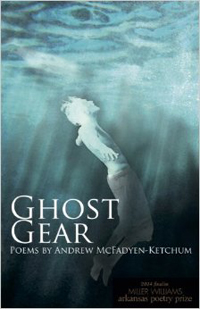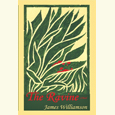Tunneling Along Memory
In his debut collection, Ghost Gear, poet Andrew McFadyen-Ketchum revisits his Nashville boyhood
“Why tunnel back along the grooved slate of memory?” asks Andrew McFadyen-Ketchum in “Slag,” one of the poems in his debut collection, Ghost Gear. It’s a question he seems to ask, in one way or another, in many of the twenty-four poems here, most of which revisit his Nashville boyhood through a rough mix of tender feeling and powerful, occasionally violent imagery. McFadyen-Ketchum’s work excavates the past almost compulsively, sometimes seeking revelation but more often simply to experience the bittersweet pleasure of remembering.
 These poems are filled with the ragged, feral energy of boys and young men who can never be still, never miss an opportunity to bump up against the world. “Sacrament” recalls “slipping through neighbors’ windows” and hammering open .22 rounds “to powder the bomb that panged / the tree-frogged dark into silence.” “Night Driving” is about just that—sneaking the family car out of the driveway for a little underage joyriding, with “the dual red eyes / of my demons so far ahead / I thought I’d never catch up.” Many injuries are suffered, and a few are inflicted: bee stings, burns, a punched nose, and a rusty nail through the foot, to name a few. It all serves to evoke the profoundly physical experience of a certain brand of male childhood. These wince-inducing moments take the poems beyond the dull world of reminiscence into the vivid, immediate realm of true memory.
These poems are filled with the ragged, feral energy of boys and young men who can never be still, never miss an opportunity to bump up against the world. “Sacrament” recalls “slipping through neighbors’ windows” and hammering open .22 rounds “to powder the bomb that panged / the tree-frogged dark into silence.” “Night Driving” is about just that—sneaking the family car out of the driveway for a little underage joyriding, with “the dual red eyes / of my demons so far ahead / I thought I’d never catch up.” Many injuries are suffered, and a few are inflicted: bee stings, burns, a punched nose, and a rusty nail through the foot, to name a few. It all serves to evoke the profoundly physical experience of a certain brand of male childhood. These wince-inducing moments take the poems beyond the dull world of reminiscence into the vivid, immediate realm of true memory.
They also serve to uncover the reader’s nerve endings in preparation for deeper, more terrible pain that lurks in McFadyen-Ketchum’s past. The effect is especially powerful in “The Word Damn and the Word God,” which begins with a surprise assault by bees —“crying countless curses, every inch of my body scorched”—and ends with a sickening act of violence:
So glory be to the Goddamns
he cried all those hours it takes a knife to the gut to kill a man.
Goddamns to the hours it must have taken Chris to die.
Every recollection of Southern boyhood seems to require a certain kind of charged encounter with nature, and that tradition exists in these poems, as well. But the landscape that inhabits McFadyen-Ketchum’s memory also includes the waste places and forgotten corners of wildness to be found in sprawling Nashville circa 1990. In “The Lives of Boys,” a trek across a derelict bridge combines an image of rural idyll with one of urban ruin.
the tang of vomit and whiskey drifting up
with the snap of rapids from the creek below
where we skipped rocks across the backs of bluegill.
 Anyone who knows Nashville well will recognize many of the settings in Ghost Gear—Richland Creek, the Lion’s Head movie theater, the Marathon building, and Old White Bridge, among others. This specificity of place lends just the right sort of mythic quality to the narratives. The places we recall from childhood are always unique and eternal, existing out of time in the particularity of memory, and their names become inseparable from our recollection of them.
Anyone who knows Nashville well will recognize many of the settings in Ghost Gear—Richland Creek, the Lion’s Head movie theater, the Marathon building, and Old White Bridge, among others. This specificity of place lends just the right sort of mythic quality to the narratives. The places we recall from childhood are always unique and eternal, existing out of time in the particularity of memory, and their names become inseparable from our recollection of them.
Truly wild, or at least rural, places figure in Ghost Gear, too, often in references to the poet’s father, who is a sort of secondary protagonist here. In “Lost Creek Cave,” father and son visit the White County landmark “where water stands in pools so clear it seems suitable / only for the holy” and find themselves trapped by a sudden flood. The brush with death becomes a shared experience of terror and a memory of love:
My father’s favorite part of the story is how,
when light finally broke around a bend in the cave,
he turned to look at me and saw me for the first time.
Childhood memories are invariably marked by memories received secondhand. The stories we hear from parents and grandparents become part of our own stories. In Ghost Gear, the father’s often repeated tale of near-drowning is owned by the son, as both a memory of his own—“I am a poet retelling a telling”—and an inherited memory:
And the last thing he sees is the wave
And the last thing he hears is something like the clap of a thousand hands
And the sea took him.
Ghost Gear is essentially a memoir, and taken as a set the poems have the compelling readability of good narrative. The abundance of action—much of it not pretty—offers readers an irresistible sense of voyeurism, while the ruminative, questioning quality of the telling encourages a more thoughtful response, as well. We may not see our own life experiences in McFadyen-Ketchum’s recollections of boyhood, but we do see our experience of memory in his poems.
[To read an excerpt from Ghost Gear, click here.]

Maria Browning is a fifth-generation Tennessean who grew up in Erin and Nashville. A graduate of Mount Holyoke College, she has attended the Clothesline School of Writing in Chicago, the Moss Workshop with Richard Bausch at the University of Memphis, and the Sewanee Writers’ Conference. She lives in White Bluff.


